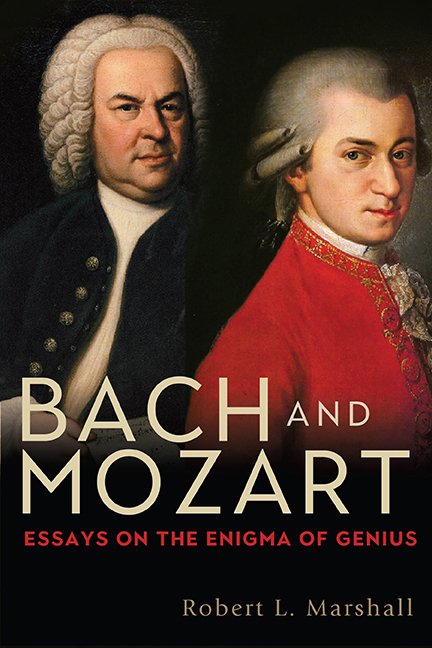Book contents
- Frontmatter
- Dedication
- Epigraph
- Contents
- List of Figures
- Preface
- List of Abbreviations
- Prologue. The Century of Bach and Mozart as a Music-Historical Epoch: A Different Argument for the Proposition
- 1 Young Man Bach: Toward a Twenty-First-Century Bach Biography
- 2 The Notebooks for Wilhelm Friedemann and Anna Magdalena Bach: Some Biographical Lessons
- 3 Bach and Luther
- 4 Redeeming the St. John Passion–and J. S. Bach
- 5 Bach's Keyboard Music
- 6 The Minimalist and Traditionalist Approaches to Performing Bach's Choral Music: Some Further Thoughts
- 7 Truth and Beauty: J. S. Bach at the Crossroads of Cultural History
- 8 Bach at Mid-Life: The Christmas Oratorio and the Search for New Paths
- 9 Bach at the Boundaries of Music History: Preliminary Reflections on the B-Minor Mass and the Late-Style Paradigm
- 10 Father and Sons: Confronting a Uniquely Daunting Paternal Legacy
- 11 Johann Christian Bach and Eros
- 12 Bach and Mozart: Styles of Musical Genius
- 13 Mozart and Amadeus
- 14 Bach and Mozart's Artistic Maturity
- 15 Mozart's Unfinished: Some Lessons of the Fragments
- Epilogue (ossia Postmortem). Had Mozart Lived Longer: Some Cautious (and Incautious) Speculations
- Notes
- Works Cited
- Index
- Miscellaneous Endmatter
- Eastman Studies in Music
Prologue. The Century of Bach and Mozart as a Music-Historical Epoch: A Different Argument for the Proposition
Published online by Cambridge University Press: 29 March 2020
- Frontmatter
- Dedication
- Epigraph
- Contents
- List of Figures
- Preface
- List of Abbreviations
- Prologue. The Century of Bach and Mozart as a Music-Historical Epoch: A Different Argument for the Proposition
- 1 Young Man Bach: Toward a Twenty-First-Century Bach Biography
- 2 The Notebooks for Wilhelm Friedemann and Anna Magdalena Bach: Some Biographical Lessons
- 3 Bach and Luther
- 4 Redeeming the St. John Passion–and J. S. Bach
- 5 Bach's Keyboard Music
- 6 The Minimalist and Traditionalist Approaches to Performing Bach's Choral Music: Some Further Thoughts
- 7 Truth and Beauty: J. S. Bach at the Crossroads of Cultural History
- 8 Bach at Mid-Life: The Christmas Oratorio and the Search for New Paths
- 9 Bach at the Boundaries of Music History: Preliminary Reflections on the B-Minor Mass and the Late-Style Paradigm
- 10 Father and Sons: Confronting a Uniquely Daunting Paternal Legacy
- 11 Johann Christian Bach and Eros
- 12 Bach and Mozart: Styles of Musical Genius
- 13 Mozart and Amadeus
- 14 Bach and Mozart's Artistic Maturity
- 15 Mozart's Unfinished: Some Lessons of the Fragments
- Epilogue (ossia Postmortem). Had Mozart Lived Longer: Some Cautious (and Incautious) Speculations
- Notes
- Works Cited
- Index
- Miscellaneous Endmatter
- Eastman Studies in Music
Summary
In the autumn of 1966, my first term as a teacher, it fell to me to offer a gradu-ate course called “Music in the Eighteenth Century.” It was part of a two-year-plus sequence of courses at the University of Chicago, conceived as a comprehensive, if basically conventional, history survey. The first year, covering the thousand-odd years from the birth of Christian chant to 1600, was divided into three parts in accordance with traditional historical and compositional categories: medieval monophony, medieval polyphony, and music of the Renaissance. The remainder of musical history, though, was not similarly divided according to the well-established stylistic categories into courses on Baroque, Classical, Romantic, and Modern music, but rather—largely as a matter of scheduling convenience—into more or less even slices of time as suggested by the calendar: with ten-week courses devoted in turn to the music of the seventeenth, eighteenth, nineteenth, and twentieth centuries. While this may not have made much difference in the case of the other style periods, the division into calendrical centuries certainly seemed arbitrary, even unnatural, in the case of the eighteenth century. For the central musical fact about the eighteenth century—as every music student knows (even before entering graduate school)—is that it was split almost precisely in half into two distinct, and virtually antithetical, “music-historical epochs.”
It was possible, of course, to ignore the fundamental historiographical problem and simply treat the musical events that occurred between circa 1700 and circa 1800 as a chronicle, taking up, one after the other, the topics and issues associated with the music of the Late Baroque, Pre-Classical, and Classical periods. The sylla-bus attempted to trace the general stylistic history of the eighteenth century as well as could be done in ten weeks (i.e., twenty ninety-minute class sessions)—which inevitably was not well at all. To begin with, the repertoire was enormous: more composers (both amateur and professional) no doubt having written more music during the eighteenth century than in any other. Moreover, the century obviously bore witness to a disproportionate number of great composers and great compo-sitions—arguably the most impressive such concentration in the history of music. This fact in turn made it necessary to consider two fairly distinct, parallel, reper-toires: the “great works” that every informed musician simply has to know, as well as the historically important and “typical” works.
- Type
- Chapter
- Information
- Bach and MozartEssays on the Engima of Genius, pp. 1 - 8Publisher: Boydell & BrewerPrint publication year: 2019



